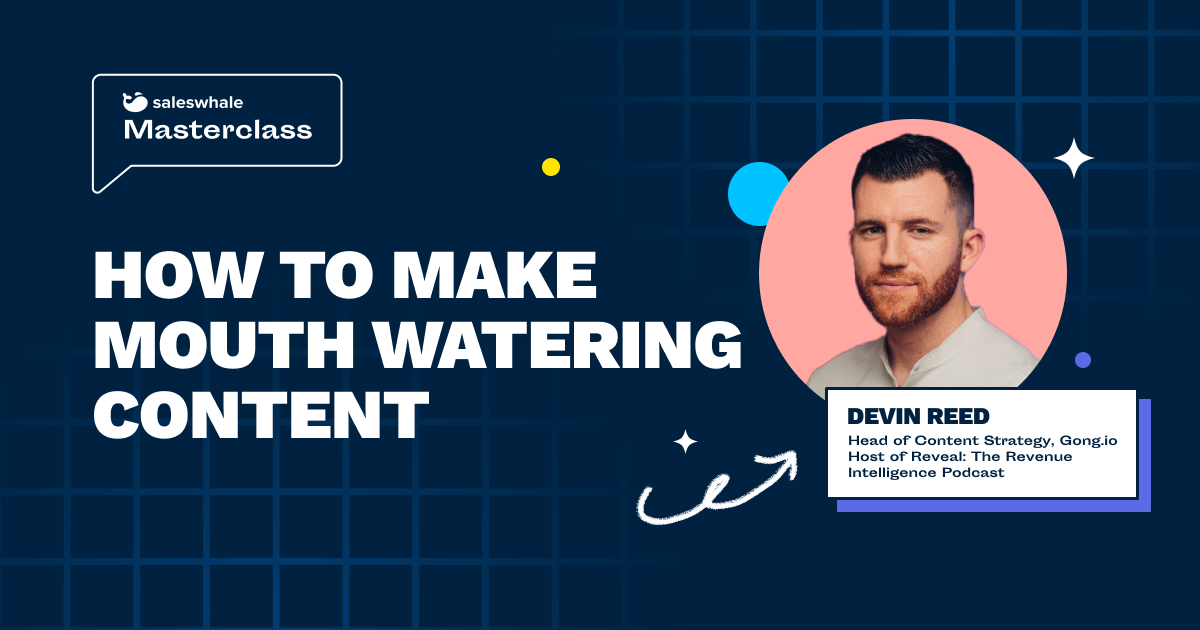
How can B2B marketers create memorable and effective content content that ultimately drives revenue?
Bio
Devin Reed is Head of Content Strategy at Gong.io, one of the leaders in the revenue intelligence space. He's also the host of Reveal: The Revenue Intelligence Podcast, Gong's very own podcast. On the side, Devin independently runs TheReeder.co, his own freelance content consultancy company. Before he made the shift to marketing, Devin worked in sales for six years in the B2B space; an experience he cites as a contributing factor to him being able to produce effective content for the B2B sales and marketing market today.
Speakers
Devin Reed, Head of Content Strategy @ Gong.io, TheReeder.co
Brandon Gargan, Director of Sales @ Saleswhale
Brandon Gargan:
Thank you for everyone who's attending, I see some people trickling in. Joining me today is Devin Reed, he was the second sales hire at Gong and he now heads up their content strategy. He runs a blog for B2B businesses called The Reader, and he's also the host of the Revenue Intelligence podcast, which was actually one of our inspirations for this masterclass series. I'm really excited to pick your brain today, Devin, so thanks for joining us.
Devin Reed:
Yeah, yeah, of course, of course, happy to be here.
Brandon Gargan:
Awesome. So selfishly, this is actually really good timing for us at Saleswhale because we've made the shift to ABM. We've been learning a lot about ABM and inbound marketing strategies, which both kind of heavily revolve around content. So to start off, you're a former sales guy who moved into content, what drew you to content?
Devin Reed:
Oh, good question, so I am a English literature major and I was actually going to school to be a teacher. So I've spent a lot of time writing and writing was always the thing I liked to do. I thought it was a good hobby and I was always curious if I could make a living out of it, and then, of course, I mean, that was only what? 10 years ago, I should say not even, since I graduated college, and content has changed so much. Where it went from only a select few people are creating content to now everybody is creating content and there's almost too much of it. So I always just thought it was interesting to get into content and figure out the different levers, like you can write a blog, but you can also write a video script, and you can write a podcast. So really just starting to leverage that skill and see how I can kind of make a big impact on the business.
Brandon Gargan:
Awesome. So for us, when I think of content, it sort of sits at the intersection of sales and marketing, so I think that your background probably helps you there, but how much does that influence your decision making on the content side of things? Do you ever feel like you're pulled in multiple directions?
Devin Reed:
I would say I am pulled in multiple directions, but it's mostly still like within marketing because we do have a bunch of different channels. We have a lot of initiatives going on, we're a fast-growing company, we were at hypergrowth before COVID and still growing now. So I think focus is part of it, but I think sales has taught me a lot of things, which the biggest thing I felt is one, keeping a pipeline. So whether you've got new deals, mid-stage, and late-stage, or if you have a content pipeline of conceptualizing, production, and then analysis of how things worked, that's still similar. Then just operating with urgency, that is something, just get things done as quickly as possible without rushing. So I wouldn't say being stretched in a bad way, but definitely some overlap in the skillset.
Brandon Gargan:
For sure, and I think a lot of companies, and this sort of includes us here, lack of clear content strategy. We're just sort of producing all of this different content that we think is cool, but we're starting to learn that we should have more of a focus there. So why is a content strategy so important for our company to iron out?
Devin Reed:
Yeah, you're not alone by the way, I'm happy I'm here on the masterclass, I still feel like it's something I can get better at, just being more precise. So I would say it's important because it serves multiple benefits, so for us, it's category creation. We're evangelizing revenue intelligence and so content plays a role in that, you have to educate the market of what revenue intelligence is, why you should care about it, and of course, place ourselves as the first choice once you realize that it's something for you. But it also has an impact on general brand growth, things like social media and people getting a feel for what we are like. Then it also has a touch on demand gen, getting leads in the funnel, and then depending on how content works at your specific company it could also be customer marketing.
Devin Reed:
It could be post-sales and customer education, so it has a lot of impact on the business, and so what you want to do is have a precise and a concise message that you're consistently telling people. Then you're telling them in different ways, based on persona different problems and then different avenues based on the channels that you're using.
Brandon Gargan:
Interesting. So is there sort of a process behind all of this or is it dependent on your vertical? What's your strategy process?
Devin Reed:
Yeah, so it starts with one, what's the overall narrative we're telling this year? So it's usually beginning of the year planning and again, so I said category creation. Now, within that we have pillars and in March we released a new product, which is our big differentiator, which is deal intelligence. So now we're saying, "Okay, revenue intelligence and the concept of revenue intelligence is using data instead of opinions, to make business decisions that helps you be more effective." So even if you're not necessarily saying that explicitly, some of the content we create will be data-backed blog posts. So we're specifically embodying that concept with the different types of content that we're putting out there, so we're starting there. The next thing is like, okay, deal intelligence is part of the product and kind of a subset in the differentiator, can we also loop that into the content as well when we're talking about, for anyone that follows Gong Labs, which is our research posts, I'll probably mention a couple of more times, is deal-specific things.
Devin Reed:
We are bringing macro trends to the market and shining a light on a more effective way that deal execution can be done. So that's kind of part of it, and then, of course, there are still times where you kind of have to go outside of your strategy a little bit, because you have a demand gen need and you have this evergreen piece of content. Maybe it doesn't perfectly fit into that strategy, but we've got some numbers we need to hit. So it's a balance, and I haven't talked to anyone who's perfectly aligned in every way, shape, or form every week, every quarter. I view it as something that you kind of stretch and grow into and you just get better over time.
Brandon Gargan:
That's awesome, it seems like there's sort of a creative element to this as well, which you obviously have nailed down. So, what would you say is the most difficult part of building a new content strategy? Like for a company who's watching this and going, "We need a content strategy." What should they be prepared for?
Devin Reed:
Man, that's a good question. I think one is going to be focus and something that Dave Peterson in the book Play Bigger, which is all about category creation, they're awesome, I love their style, if you haven't read the book, he calls it gravity. Now, gravity is going to be something, it's kind of specific for the category design, but I've found that when you have a content strategy, it's the same thing. So, gravity is the natural pull to do what is safe and to do what you know will work, so for example, you might be like, "Hey, we're going to make this manifesto or this high-level thought leadership piece, but we're probably not going to get a bunch of downloads. We're probably not going to get a bunch of demo requests." Because you're just educating the market, you might have some internal feedback or conflict, of people would be like, "Well, why are we doing this? This doesn't make sense." Or, "This isn't going to have an immediate traceable impact on the business."
Devin Reed:
And that's just one example, you'll get a bunch of different ones too. But the overall thing is, the challenge is getting I think, internal alignment and focus, like making sure that you're not moving away from that strategic narrative or whatever that narrative is for your company. It's really easy in January to be hitting your high, you're fresh, you're excited and then mid-February comes around and then it's end of the quarter in March and people need leads, or people need this and that. So it's easy to start to stray slowly and slowly away from that, and then the other one I think is just repurposing content so that you're not making that big, high-level thought leadership that's sitting on the shelf for a week or two, and then people forget about it. But being able to effectively repurpose those things.
Devin Reed:
So can you start with this new Forester report, and then can you break that down into social posts? Can you break those down into more consumable, snackable pieces of content like blogs? Can you make videos out of it? Can you make webinars out of it? The goal and what I'm trying to strive for is get one big home run piece of content, a meaty thing, and then break that down into other channels. So it should be able to feed the content engine for weeks, months, maybe even across the whole year, if it's evergreen.
Brandon Gargan:
Yeah, I like that, that's something we've been focusing on is sort of that microcontent strategy, I'm sure we'll just dice this up here into a bunch of one-minute clips and let that run for a while. But speaking of your Strategy, Gong absolutely dominates the revenue intelligence space, if you will, in terms of content. In fact, I feel like Gong sort of made the term revenue intelligence meaningful or at least brought into the mainstream because I just associate revenue intelligence with Gong having used it so much. So, what do you think has made your content so successful? How have you guys dominated that marketplace, and how do you stand out from all the other noise that you mentioned?
Devin Reed:
Yeah, well, thank you for one, just validated months of work by telling me that you know revenue intelligence exists and Gong is part of it, So thank you. I need everyone in our market to feel the same and then that's when I'll know my job is done. But yeah, I think really what it comes down to is the quality of the content, and quality is subjective. I've got people that, you tell me you love my content, I'll get someone who says my content sucks, happens once in a while, so what does that mean? So the formula that I follow and that we followed since day one is high-level be different, different is better than better. So for example, we're not trying to make the top 10 sales tips that you've ever heard before, and they're all things you've Googled or HubSpot has already written.
Devin Reed:
You're trying to be better, but you're not really being different, our difference is that we have data-backed research. So we use our product data, so like things our product users are doing, we analyze that and we find trends and behaviors and start to educate the market and say, "Hey, here's what we're finding. We found that being more patient on a discovery call or talking less on a discovery call has higher success rates." We were the first ones to do that, that was really interesting for people a couple years ago. No one had ever even considered that or if they had, they couldn't see it on paper. Everyone knows salespeople should listen, they shouldn't talk, but now we had a definitive graph to show you, "Hey, we analyzed 500,000 calls."
Devin Reed:
So people started coming to us as this authoritative content channel because you can't get that anywhere else, nowhere else on the internet can you find these things. So, of course, we also market ourselves as that, I think we're the best sales blog on the planet because we're the only sales backlog on the planet. So we have some authoritative there, so I think that's been really impactful is different, not better. Then the other thing is kind of like a three-piece formula, so one, is this content relevant? Is this something? Is this a problem or a topic that your audience cares about today? Is it insightful? Is this something that, like I said, it could be data-backed, it could be a unique storyline or perspective that no one has really considered before. The way that I gauge insight is your eyebrows have to raise or go down.
Devin Reed:
So, if you read something interesting, you're like, "Oh, oh, that's cool, I hadn't thought of that." Or maybe you're reading something and you're like, "Oh, that's, that's interesting, what do I think about that?" But if that doesn't happen during some pieces of our content, then I know it's flat, it hasn't hit home quite yet. So that's the other one, and the other one is, I don't know if it's the most important, but it's very important, is immediately actionable. So, don't just give someone guruism of like high-level things, "People could do this, should do that." And then sign off. You've got to give people a really actionable next step, "Take this, here's exactly how you can use it, here's a template you can download here's a checklist you can keep on your desk, here's a playbook you can share with your team." So that way people are getting new information, but then they feel that they can take that information and actually apply it to their job so that they're improving and then they want to associate with you more because you're helping them do better at their job.
Brandon Gargan:
I love that. When you're creating a piece of content outside of the whole strategy discussion, is there something that you keep in the back of your mind, like one thing or one pillar that you kind of judge that piece of content against?
Devin Reed:
Not really. I would just say I look at every piece of content is like, "This could be the last time someone looks at the content if it's boring." I tell myself all the time, "My last marketing touch could be my last marketing touch." You know what I mean? You're only really allowed one bad email, not a bad email, but some emails you're like, "It's not that good." I mean, you do two or three in a row and you get unsubscribed or people just start not taking you seriously. I try to do that with the blog posts, the video, I want it to be so good people want to share it. I want it to be so good that people are willing to pay for it, they don't have to, it's free content, but they leave and they're like, "I would have paid 10 bucks for that course or that video." You know what I mean? So it's really just holding ourselves to a really high bar, and thinking like, "Hey, has this been done before? And if so, are really putting a unique spin on it?"
Brandon Gargan:
Sure. So, one thing that we hear from a lot of companies is, "I don't have enough time to create all this content." And that's something that we've obviously run into here, we're a smaller company. So how do you prioritize which content? And we've talked about all the different channels and all the different effects that content has on the business. How do you personally prioritize which content to go out there?
Devin Reed:
Yeah. It's tough, it's a tough battle, to be honest, and you have a weekly podcast, you need to give that attention, and you have a monthly blog series, you need to give that attention. So there's things that are again, that's kind of like gravity, time-based things to me are gravity. So in terms of prioritizing is going back to like, "What are we trying to accomplish this quarter? What does the marketing team need to do to help the sales team so they can hit their number?" Now, that could be a segment based conversation, maybe SMB is doing really well, and enterprises is down 20% or they're not tracking, just an example.
Devin Reed:
So then it's like, "Okay, let's look at the numbers and look at all of our content, what personas are downloading it? How is it converting up and down market so we can understand basically start to triangulate a piece of content like, "Should we make a blog? Should we make a video series? How should we position that?" So that's how we prioritize, it has to hit a number at the end of the day. The fun part is what the messaging is, and like the creation of that, but you have to start at that strategic level to make sure that you don't have 150% of your MQLs in one segment, but then another one is starving. So I just start that way and then I kind of reverse engineer.
Brandon Gargan:
Cool. It's a lot like sales, everything's sort of numbers-driven, you can work backwards and find the problem pretty easy.
Devin Reed:
For better or for worse, yes, and that is how I like to keep our content team - it's like, "We are essentially in the sales game, we just create content instead of calls."
Brandon Gargan:
Sure. So, I know I've learned a lot so far hosting this masterclass series, last week was awesome for me. Your Revenue Intelligence podcast has a lot of really smart, accomplished people on it, I've been watching them kind of back, to back, to back in preparation for this. What was one of your favorite episodes and what did you learn from that episode?
Devin Reed:
That's a good one. Well, thank you for listening to the podcast, I'm glad you enjoyed it. Every episode kind of teaches me something a little different, so I think the first thing I learned doing it in the first 10 weeks, and these are people highly successful, they're all probably all millionaires, like multi-millionaires, and we don't talk about money but I've got a six-year career under me, I'm pretty young in my career and the first 10 weeks were intimidating. It's tough to step into like these ... And we were in the same room at the time, and hold your own and be confident knowing I have so much to learn. But I think that's what I learned, was that I'm actually going to learn a lot during this process.
Devin Reed:
And I learned how to be a better interviewer, I'm still learning how to surface better responses out of people, which kind of goes back to my sales days and discovery. It really is a discovery, a conversation, you're just kind of directing it differently. My favorite episode though was Andrew Sykes, probably, so he's not even your kind of typical SAS sales leader, he runs a company called Habits At Work or Working Habits. Forgive me, Andrew, for not remembering off the top of my head, but the thing I learned was there's a stark difference between experience and practice. Now, a lot of times people want to improve, and so they think, "Hey, if I'm just in my role for two, three years, I will become highly skilled." But he was like, "I think we all know people in the professional world that have been in their role for very long or you've known for a while and they're not very good, they're okay."
Devin Reed:
And the best people and he kind of coaches around this is like, they dedicate time to practice their craft outside of working hours, and so that's something that really just resonated with me because I think even myself, I'm like, "Oh, I'm creating content all the time, I'm creating so many different types of content." But I have to dedicate time outside of that to really review it and really coach myself objectively and say, "Hey, how can I get better?" And then actually practice those things, whether it's writing better discovery questions for the podcast, or finding unique angles and practicing writing for the blog, and so on and so forth.
Brandon Gargan:
That's awesome. That's actually something I learned a long time ago in my sales career. It's like sales isn't exactly 9:00 to 5:00, I think everybody knows that. But at the end of the day, just because I'm working outside of those hours, doesn't really mean that I'm learning anything. So that was my first introduction to any sort of content was a lot of that sales stuff. It's like, "How do I learn this strategy? What techniques are working?" And obviously.], Gong's content has been really helpful for that. So what do you think is the biggest content fail that you've seen a company do?
Devin Reed:
Oh man, biggest content fail? I know my biggest fail, that's what came to my mind really quickly was the one that hangs with me. Oh man, let me think for a second, the biggest fail? I usually think of the other way, things I like, I think the biggest fail isn't really a specific campaign that I've seen someone do. The only thing that comes to mind was ... No, I don't want to throw anyone's name on the bus, that's messed up. The only thing I think is a fail currently is people that aren't using LinkedIn to share their content in as an organic channel. So a lot of people, you look at their company page and the last update was five months ago. So I think that's a miss because I think you can get a lot of reach through your company page.
Devin Reed:
I think also, that you can use the evangelist play, which is picking a few people at your company, whether they're VPs or SDRs, and really using their following and building their following by also implementing some of the content. So you can use it as a publication channel, I do it all the time and we see hundreds of thousands of views and likes or not hundreds of thousands of likes, but hundreds of thousands of views. Thousands of likes, not just through myself, but through the Gong channel and through some of our thought leaders because we arm them and just enable them to share our content. But also, just to share their own and build their own brand, and so I think a lot of companies are missing out on that because their audience is on LinkedIn but they're not really publishing on LinkedIn, they're really worried about site visits.
Brandon Gargan:
Yeah, we've started to see success from that too, so that's huge for us. All right, one last question for you and then I'll let you go. What advice do you have for someone, sales guy, or whoever, who has a passion for content, but maybe isn't in that space quite yet, like a younger version of you, what advice would you give them?
Devin Reed:
If I was going to go give myself the same advice, I would say make the leap sooner, so don't wait for the perfect timing, but also prep for it. So, what I did was actually at the same time I started Gong I was also looking at sales enablement roles, maybe marketing jobs, thinking about the pivot. But I was really nervous because I knew sales really well, and I was nervous to let something go and take the risk for something else. So what I did was I started the Reader, which is just me freelancing and so I went around and I tried to find clients, and just would anyone hire me to create content for them? And once they did and people started paying me money, I realized, "Oh, I must be at least kind of good, people are paying me to do this so I must have something."
Devin Reed:
It also tested my abilities and my commitment to it because I'm still working a full-time job and then I'm freelancing on the side, nights, and weekends. And the reason I think that's really important is it builds up a portfolio because it's really tough to go from sales into marketing or to just say, "Hey, I'm great at maybe product marketing, but I want to move into demand gen." And maybe that's a different muscle or what have you. So what I did was just build out that portfolio and experience and then I also built out a program at Gong, which was a LinkedIn live show. Again, while still in sales, I went to the CMO, pitched a podcast, ended up with the live LinkedIn video show. But I ran with it, and so after 10, 15 weeks, our CMO realized like, "Hey, I have the skills to build this out, I have the commitment to make it work."
Devin Reed:
So then when I went to him and asked for the position because it was open, it was a much easier, shorter conversation because I had already proved like, "Hey, for the last 18 months, I'm doing this on my own, last six months I've been doing this with you." So it kind like building job experience on the fly instead of just expecting someone to love your resume and maybe hire you.
Brandon Gargan:
Yeah, I think that's awesome advice just in general, if you prove you can handle the projects in your current role, it's sort of a no brainer.
Devin Reed:
Yeah.
Brandon Gargan:
Awesome. Well, that wraps up today's masterclass, everyone. Devin, thank you so much for joining us. This has been awesome and I'm going to re-watch it, I took about a page of notes here. Ugly notes that I didn't really look down at, but anyways, everyone else who attended, thank you for your time today. Please keep an eye out, we've got some more awesome masterclasses coming, starting tomorrow with Megan Eisenberg. So, thanks everyone, and thank you, Devin, again.
Devin Reed:
Absolutely, man, catch you later.
Brandon Gargan:
All right, take care, bye.


Co-founder & CEO at Saleswhale
Sign up for cutting edge ideas on conversational marketing, AI assistants and martech.
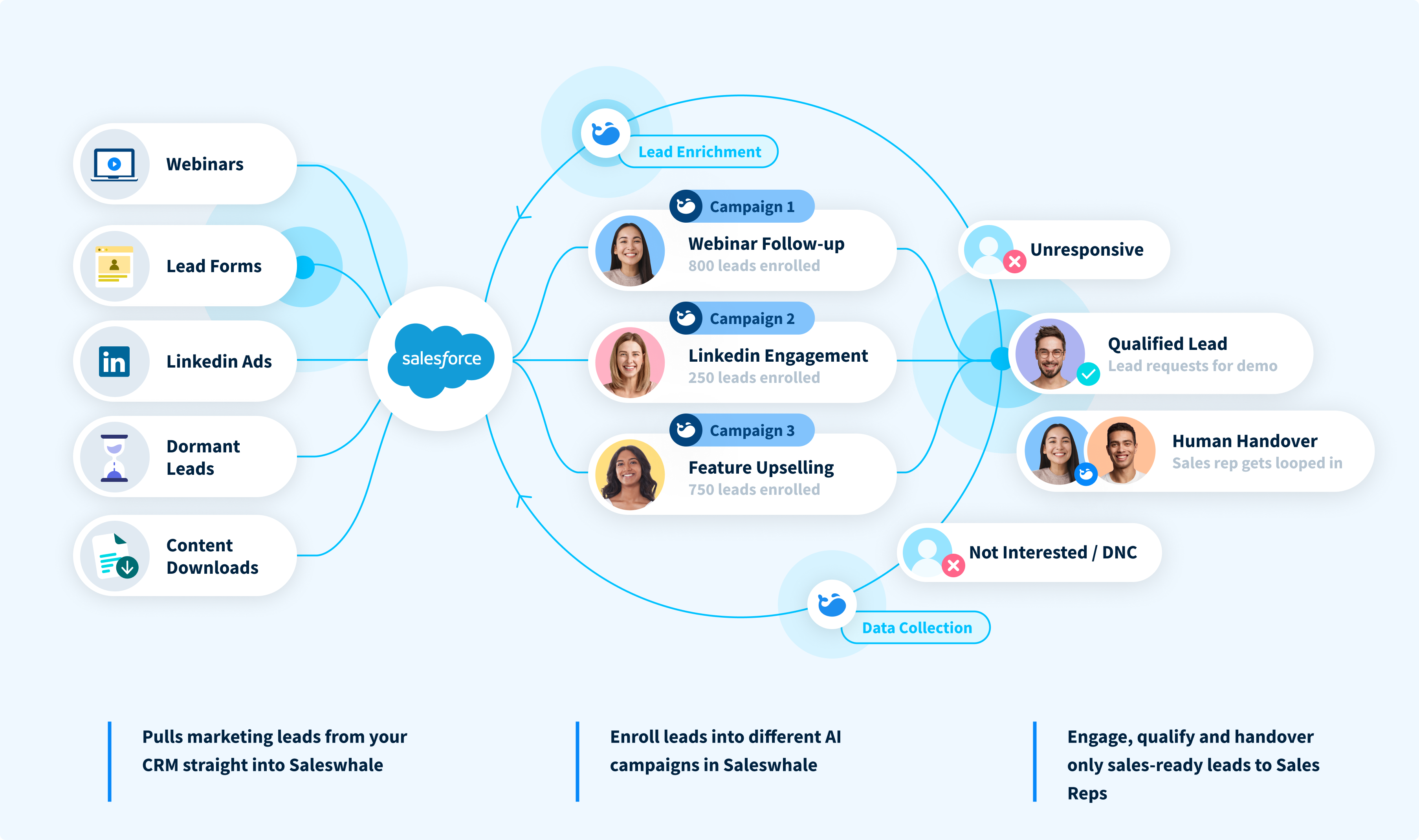
Saleswhale for Salesforce allows you to build powerful automated lead conversion workflows. This allows you to re-engage with your neglected marketing leads at...
19 APR 2021
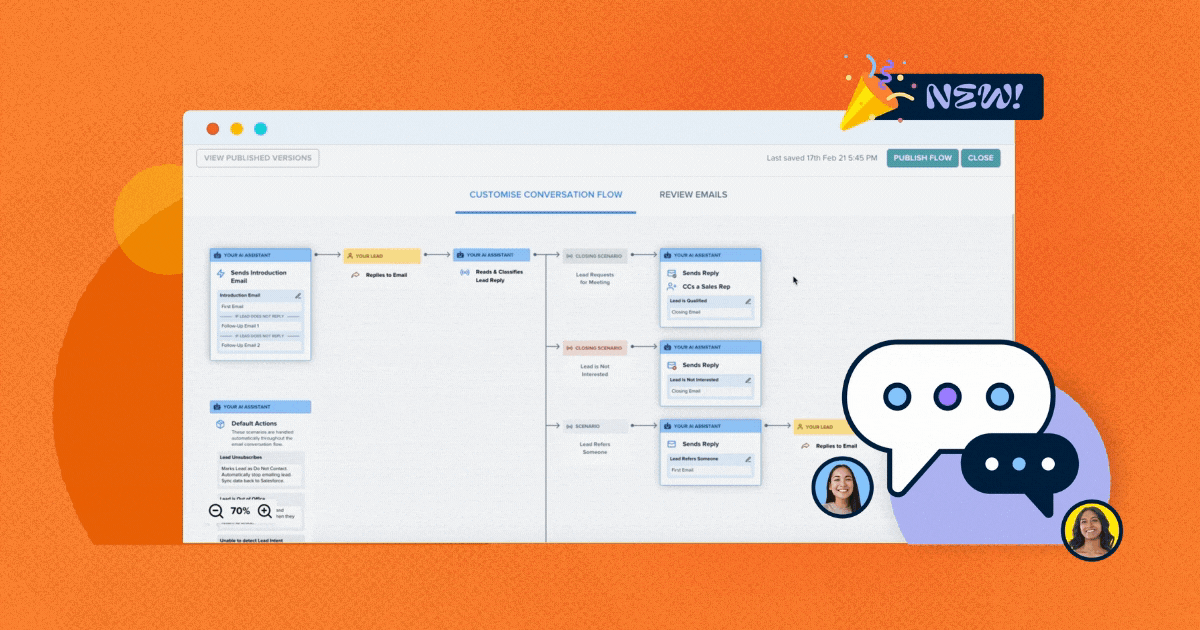
Demand generation and marketing teams generate more leads at the top of the funnel than ever in this new digital-first world. Saleswhale helps ensure those...
1 MAR 2021
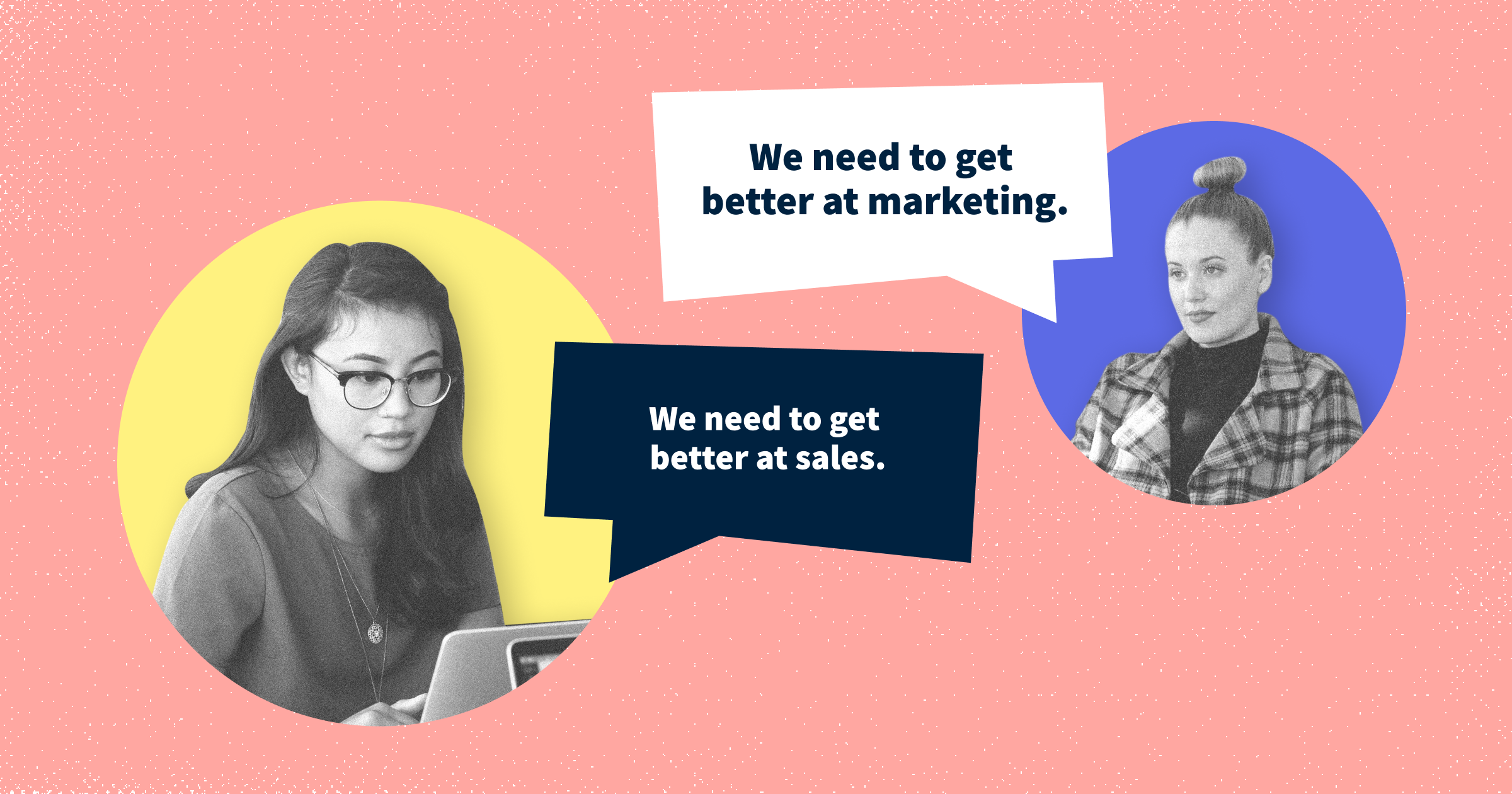
Marketers that focus on MQLs end up doing the wrong things in order to achieve the metrics. So I changed it.
16 JUN 2020
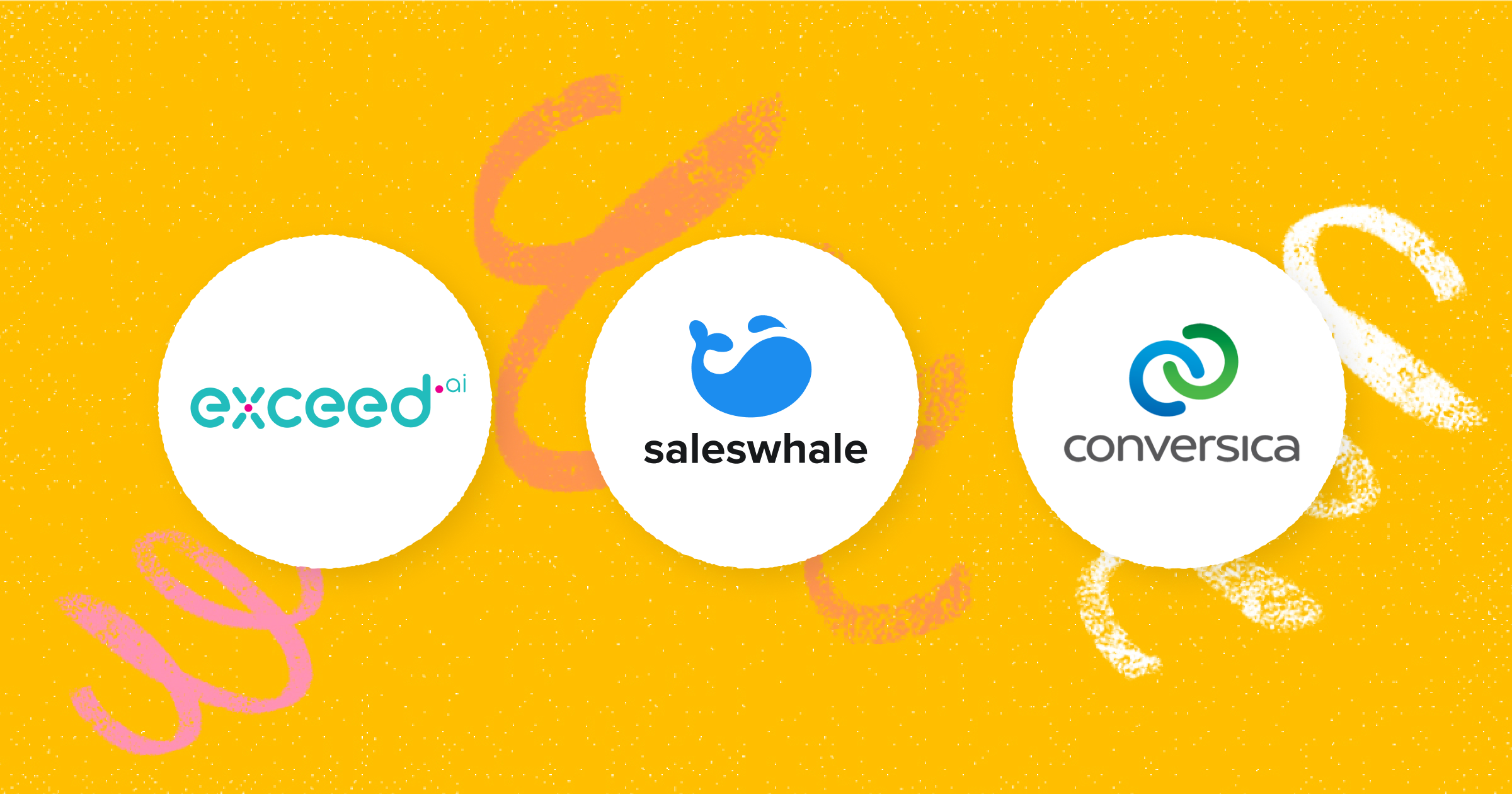
Conversica isn't the only player out there. Learn how Saleswhale and Exceed.ai compare and make an informed decision.
15 APR 2021
By providing your email you consent to allow Saleswhale to store and process the personal information submitted above to provide you the content requested.
You can unsubscribe at any time by clicking the link in the footer of our emails. For information about our privacy practices, please visit our privacy page.